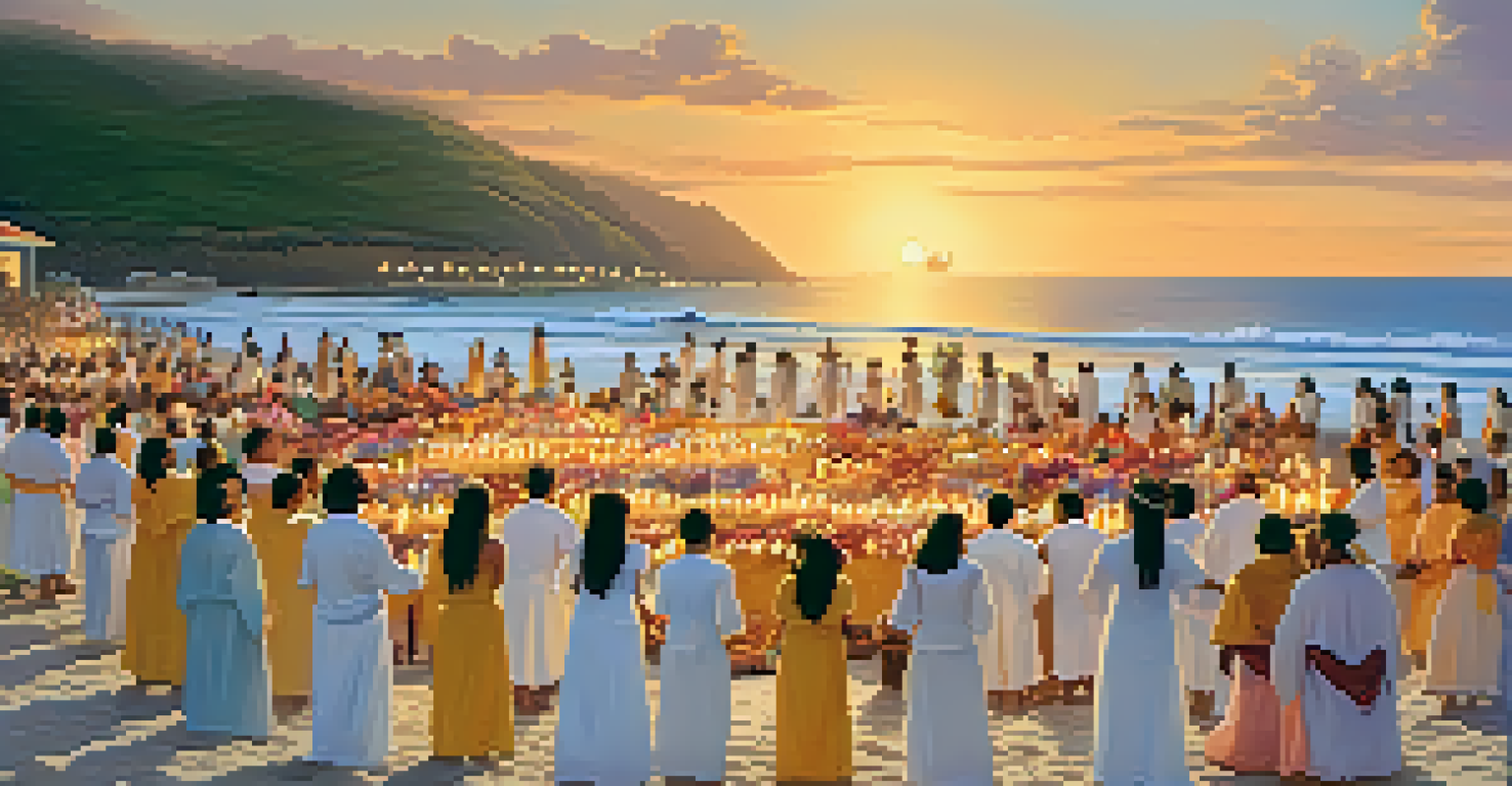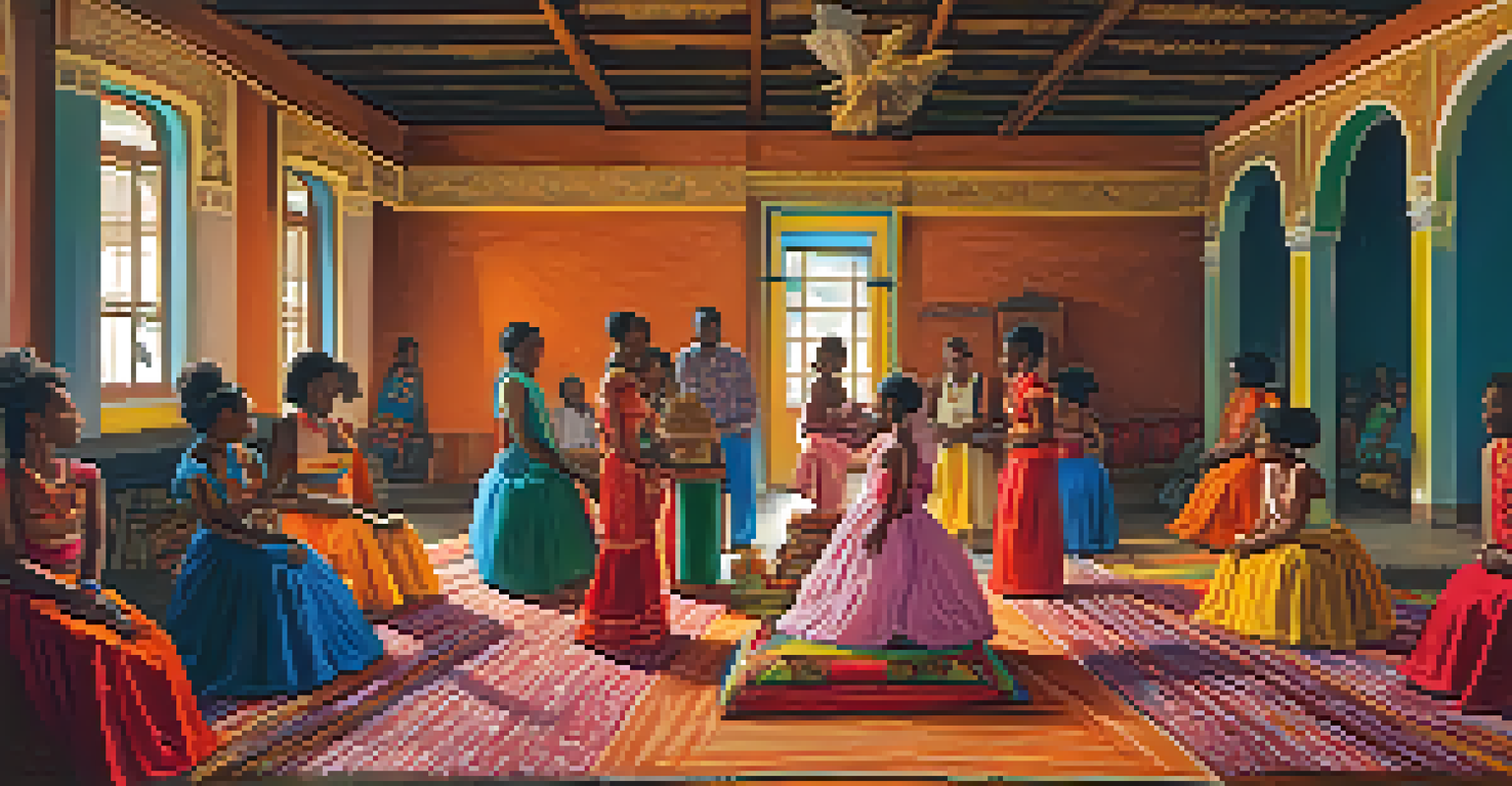Religious Tourism in Brazil: An Overview of Sacred Sites

Understanding Religious Tourism in Brazil
Religious tourism in Brazil blends spirituality with cultural exploration, attracting millions each year. It encompasses travel to sacred sites, pilgrimage routes, and religious festivals that highlight Brazil’s diverse spiritual landscape. Whether it's visiting historic cathedrals or participating in vibrant ceremonies, this form of tourism offers a unique glimpse into the country's soul.
Traveling – it leaves you speechless, then turns you into a storyteller.
The roots of religious tourism in Brazil can be traced back to its indigenous cultures, colonization, and the spread of various faiths, including Catholicism, Afro-Brazilian religions, and Protestantism. Each faith brings its unique traditions, enriching the religious tapestry of the country. This diversity makes Brazil a compelling destination for those interested in exploring different spiritual practices.
As travelers seek deeper connections beyond mere sightseeing, religious tourism provides an opportunity for personal reflection and cultural appreciation. Pilgrimages to sacred sites often foster a sense of community and belonging among participants, creating lasting memories and connections with others on similar journeys.
Iconic Religious Sites to Visit in Brazil
Brazil is home to numerous iconic religious sites that draw visitors from around the globe. One of the most famous is the Christ the Redeemer statue in Rio de Janeiro, a symbol of peace and welcome that overlooks the city. This monumental statue is not only an architectural marvel but also a site of deep spiritual significance for many, making it a must-visit for any traveler.

Another significant site is the Sanctuary of Our Lady of Aparecida, Brazil's patron saint. Located in Aparecida, this basilica is one of the largest in the world and attracts millions of pilgrims each year. The atmosphere during the feast of Our Lady of Aparecida is electric, filled with devotion and celebration, showcasing the profound impact of faith on Brazilian culture.
Rich Spiritual Diversity in Brazil
Brazil's religious tourism showcases a vibrant blend of faiths, including Catholicism and Afro-Brazilian religions, making it a unique destination for spiritual exploration.
The historic towns of Ouro Preto and Salvador also offer rich religious heritage through their colonial churches and vibrant festivals. These locations are perfect for those who wish to immerse themselves in the artistic and cultural expressions of Brazil's spiritual history, providing a deeper understanding of the country's devotion.
The Role of Festivals in Religious Tourism
Festivals play a vital role in Brazil's religious tourism landscape, drawing crowds with their colorful celebrations and deep-rooted traditions. Events like Carnival, while often seen as secular, have strong religious undertones, reflecting the country's blend of spirituality and festivity. This unique fusion offers visitors an opportunity to experience the joy and vibrancy of Brazil's culture firsthand.
The journey is the destination.
Another notable festival is the Festa de Iemanjá, celebrated along the coast, honoring the Afro-Brazilian goddess of the sea. Every February, devotees gather to offer flowers and gifts, creating a stunning visual spectacle. This event not only highlights Brazil's rich Afro-Brazilian heritage but also invites tourists to witness and participate in the profound expressions of faith.
Participating in these festivals allows travelers to engage with local communities and appreciate the cultural significance of these events. It's an experience that transcends mere observation, fostering understanding and connection through shared joy and devotion.
Religious Pilgrimages: A Journey of Faith
Pilgrimages in Brazil offer a transformative experience for many travelers, allowing them to embark on a spiritual journey that often leads to personal growth. One of the most famous pilgrimage routes is the Caminho da Fé, which stretches over 500 kilometers and culminates at the Sanctuary of Our Lady of Aparecida. This trek not only challenges physical endurance but also invites introspection and spiritual renewal.
Along the way, pilgrims encounter various towns, churches, and fellow travelers, creating a sense of community and shared purpose. The stories and experiences exchanged during these journeys enrich the pilgrimage, emphasizing the importance of faith and connection in the process. Many participants report feeling a profound sense of peace and fulfillment by the journey's end.
Festivals Enhance Cultural Experience
Colorful festivals like Carnival and the Festa de Iemanjá invite tourists to engage deeply with local traditions and the spiritual significance behind these celebrations.
Whether you're a devout believer or simply curious about religious practices, participating in a pilgrimage can be a deeply enriching experience. It invites individuals to step away from the bustle of daily life and engage with their faith, making it a meaningful aspect of Brazil's religious tourism.
Exploring Afro-Brazilian Religious Sites
Afro-Brazilian religions, such as Candomblé and Umbanda, play a significant role in Brazil's spiritual landscape. These faiths, which blend African traditions with elements of Christianity, provide unique insights into the country’s cultural heritage. Visiting terreiros, or spiritual temples, offers travelers a chance to witness rituals and ceremonies that celebrate life, nature, and community.
One notable site is the Casa de Iemanjá in Salvador, where visitors can learn about the practices and beliefs associated with these Afro-Brazilian religions. The vibrant colors, rhythmic music, and passionate dance create an immersive experience that captivates the senses and fosters a deeper understanding of this spiritual tradition. Many find themselves moved by the sense of community and belonging within these spaces.
Engaging with Afro-Brazilian religious sites not only enriches the travel experience but also promotes cultural appreciation and respect. It encourages visitors to embrace Brazil's diverse spiritual heritage and recognize the importance of these practices in shaping the nation's identity.
The Impact of Religious Tourism on Local Economies
Religious tourism has a significant impact on local economies in Brazil, providing a vital source of income for many communities. Pilgrimages and festivals attract millions of visitors, leading to increased demand for services such as accommodations, dining, and transportation. This influx of tourists can help revitalize local businesses and create job opportunities, contributing to overall economic growth.
Moreover, the preservation of sacred sites and cultural traditions often receives a boost through religious tourism. As communities recognize the economic benefits of maintaining these sites, they invest in restoration and conservation efforts, ensuring that future generations can continue to experience their heritage. This creates a symbiotic relationship between tourism and cultural preservation.
Economic Boost from Pilgrimages
Religious tourism significantly contributes to local economies by increasing demand for services and encouraging the preservation of sacred sites.
However, it's essential to balance tourism with sustainability to protect these sacred spaces. Engaging local communities in tourism planning can help ensure that the benefits of religious tourism are shared equitably, promoting a lasting positive impact on both the economy and the cultural landscape.
Challenges and Opportunities in Religious Tourism
While religious tourism in Brazil offers numerous benefits, it also comes with its own set of challenges. Overcrowding at popular sites can lead to environmental degradation and dilute the spiritual experience for visitors. It's crucial for stakeholders to implement sustainable practices that protect these sacred spaces while still accommodating tourists.
Additionally, the commercialization of religious events can sometimes conflict with their original spiritual significance. Striking a balance between attracting tourists and preserving the authenticity of these experiences is essential for maintaining their cultural integrity. Engaging local communities in the tourism process can help ensure that the essence of these traditions remains intact.

Despite these challenges, there are ample opportunities for growth in Brazil's religious tourism sector. By promoting lesser-known sites and experiences, travelers can discover the rich diversity of Brazil's spiritual landscape while alleviating pressure on overcrowded locations. This approach not only enriches the travel experience but also supports sustainable tourism practices.